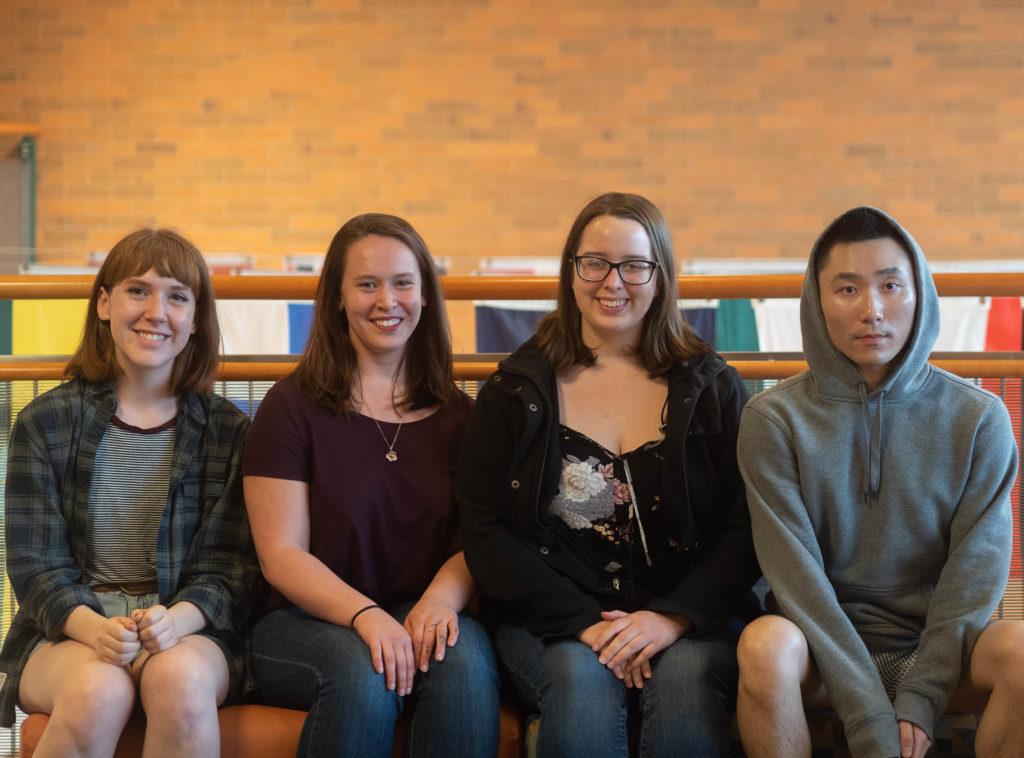
Sara Ashbaugh, Emma Friedlander, Ryan Hung and Emma Traband, all ’18, and Isabel Monaghan ’16 received the Fulbright U.S Grant. All five recipients received grants for the English Teaching Assistantship (ETA).
According to the official Fulbright website, the Grant “facilitates cultural exchange through direct interaction on an individual basis in the classroom, field, home, and in routine tasks, allowing the grantee to gain an appreciation of others’ viewpoints and beliefs, the way they do things, and the way they think.” Assistant Dean and Director of Global Fellowships and Awards Ann Landstrom echoed this sentiment, saying that “Fulbright U.S. student grantees are seen as ambassadors around the world.”
Ashbaugh and Friedlander will go to Russia, Hung to South Korea, Monaghan to Austria and Traband to Germany, each with their own motivations and goals to teach English.
For Friedlander, a history and Russian double major, applying to the Fulbright had not always been her plan. She only decided to do so last summer, after thinking through her post-grad plans.
“I wasn’t completely sure at first because I was like, ‘I don’t know if I want to teach English for the rest of my life,’” she said. “But it was a really great way to get immersed in a country that I had been studying in the classroom for such a long time.”
Friedlander will be teaching English at a university level while also doing a “public history project” through which she will explore the history of the community she is placed in. While she has not been assigned to a city yet, she is excited to be placed in a city that not a lot of students would have the opportunity to go to.
Ashbaugh, a Russian and political science double major, who will also be teaching English in Russia, also expressed excitement about living in another country, and is ready for the challenges that may come with it.
“Living in Russia will be challenging for a lot of reasons, especially since I don’t speak the language incredibly well. I’ve been studying it for four years now but I’m not fluent in it so I think it will be a challenge just to navigate that language barrier,” she said. “But that’s why I applied to the Fulbright, partially because I really wanted to live in Russia and to solidify my language skills and keep working on my language after college. So I’m really excited about that, too. So it’s … a challenge but an exciting challenge, I suppose.”
For Hung, a theatre and dance major who will be teaching English to high school students in South Korea, his community engagement project is closely related to his undergraduate area of study.
“My community engagement project revolves around me working with other local creative artists and creating work in the medium of performance as well as trying to enlarge the accessibility of the arts for local children in the area [that] I am placed,” he said.
Traband, a German and biology double major, will teach English to students in Germany, and her community engagement project was inspired by her college study abroad experience.
“My community engagement project is focused around regional museums since, when I was studying abroad in Germany, I found the variety of regional history museums and kind of special topics museums really interesting,” Traband said.
The recipients with little teaching experience feel that the teaching aspect will be another exciting aspect of the grant that will challenge them
“They emphasize in the application process that teaching experience is not necessary — it’s more the idea that you are able to explain American culture and American politics to another country within this English teaching setting,” Friedlander said. “That will definitely be a new thing to tackle.”
Hung, who has had some teaching experience, agreed.
“I’ve had peer mentoring experiences in high school and in Grinnell, and I have tutored in the past in high school and I have also been an ALSO creative writing tutor at Grinnell, and I have actually taken education courses here, but in terms of teaching English that’s a different dynamic,” he said. “But I think it’ll all work out.”
The application started from October and, after the semi-finalists were announced in January, the recipients waited to hear the final results between February and May. The early application period and waiting to hear the results made it a long process. However, throughout the process, Landstrom helped the applicants each step of the way.
“I strive to be an essential part of the Grinnell College experience for those interested in applying for Global Fellowships and Awards. I believe quite strongly that ‘it takes a village’ to mentor and guide students through their college years and especially so through a fellowship, scholarship, or grant application process,” Lanstrom wrote in an email to The S&B. “My fellowship advising approach is to get to know the student or alumna/us – their background, education, experiences, activities, strengths, skills, interests and passion.” This support was felt by the recipients.
“If ther e’s anybody that’s thinking of doing a Fulbright in the future, you do have good resources at Grinnell,” Friedlander said.
—Editor’s note: Emma Friedlander is the editor-in-chief of The S&B.































































